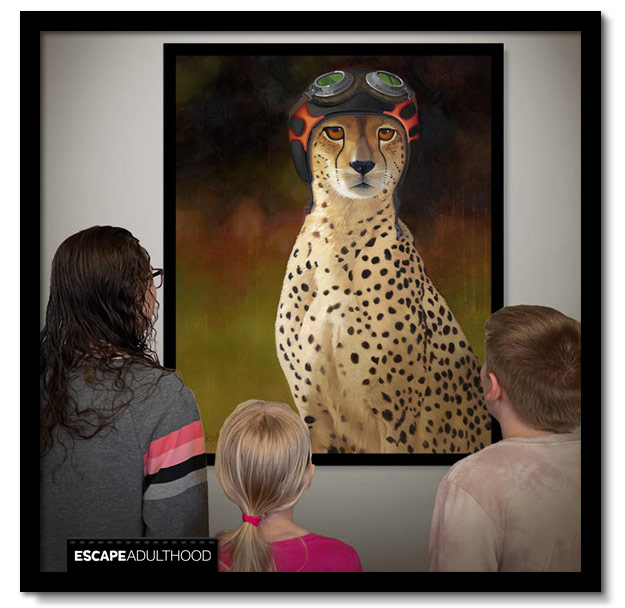
I took my kids to the art museum the other day. It had an exhibit going featuring artwork by local students, from kindergarten up to high school. Afterward, we checked out the other exhibits from the more experienced, grown-up artists.
I liked the stuff from the kids better.
It got me thinking about the role a museum curator plays. A quick Google search explains that he or she acquires, cares for, and develops a collection. They also arrange displays of collected and loaned works and interpret the collection in order to inform, educate, and inspire the public.
I wonder how they decide what exhibits to run, what artists to feature. How do they choose what paintings to include in each show? I know enough about the job to understand that oftentimes, the curator has a certain narrative they are trying to tell with a particular exhibit, and the goal isn’t necessarily to show the “best” work, which is mostly subjective anyway. Rather, they select pieces that support the story they’re telling. And no matter how big the museum is, space is not finite, so every piece included means that others will have to be left out.
We rely on curation every single day, and I’m not just talking about art museums.
In the olden days, and even in many third-world countries, lack of knowledge is a problem. Not for us. In an era when we’re flooded with more information in a day than a person living a few hundred years ago had to deal with in her whole lifetime, curation is more important than ever. The trick isn’t uncovering more information, it’s deciding what matters and what doesn’t. That’s the power of curation.
At the restaurant, we ask the waitress what she recommends.
We rely on bestseller lists to tell us which books are worth reading.
We let Netflix suggest movies to watch based on our past viewing preferences.
We depend on the organizers of the conference we are attending to assemble the experts worth hearing from.
We even curate our social media feeds to deliver news and updates from people we know, like, and trust. (Even though this may not result in us receiving a full or accurate picture of reality.)
Early in our lives, our parents or guardians serve as curators for our life. That’s especially how Kim and I view our responsibility as homeschooling parents. We don’t feel pressure to “teach” our kids anything, but rather to assemble for them a tapestry of experiences and opportunities that might spark their curiosity. That curiosity takes care of the learning just fine.
In the last few weeks, we’ve watched documentaries about the international space station, Disney animators, and a free solo rock climber named Alex. We haunted the library and spent an hour browsing the stacks of books we collected from the shelves. We went to a rock concert and are planning a field trip to see how they tap maple trees for syrup.
On the flip side, we also make choices about what things to exclude from their young lives. We consider their level of maturity and understanding and wisely discern what’s useful and what’s rubbish; what will help them grow and what might lead them astray. We limit screen time, sweets, and movies we don’t feel are appropriate. We realize we cannot protect them from all the darkness they will encounter in life, but we shield them from dangerous situations as best as we can during these formative years.
Good parents are the curator of their kids’ lives until they have grown in age and wisdom to be able to curate their own.
Regardless of how intentional or effective your parents were about the task, the job of curating your life is now yours alone.
Like a museum curator, you are telling a story with your life. How deliberate are you?
What movies do you watch?
What books do you read?
Where do you get your news?
What websites do you frequent?
Who do you follow on social media?
What foods do you eat?
Where do you travel?
What people are you allowing into your life?
What habits are you cultivating? What experiences and ideas are you exposing yourself to?
“The ideas you consume determine the person you’ll become.”
– Josh Spector
Every decision about how you spend every minute of your day is a choice, whether it’s conscious or not. Are the choices helping you grow and thrive? Or are they leaving you less healthy and more depressed? Are they growing flowers or sowing weeds?
The things that you allow into your life are important, but so are the things you decide to leave out, such as negative influences, time sucks, and activities that distract you from living your best life. Successful serial entrepreneur Gary Vaynerchuk reminds us of this true fact: “Miraculous things happen when you cut out your most pessimistic friend. You become more optimistic.”
Regardless of how much thought or time you’ve put into it, understand this: you are the curator of your life.
How would you rate it? Is it meh…or amazing?
Is there something you could add or remove that would make your story stronger?
A lot of questions here, and I’m afraid I’m not able to provide many answers.
Your time is finite and the decisions about this exhibition called life are entirely yours.
May your brave choices wow us all.